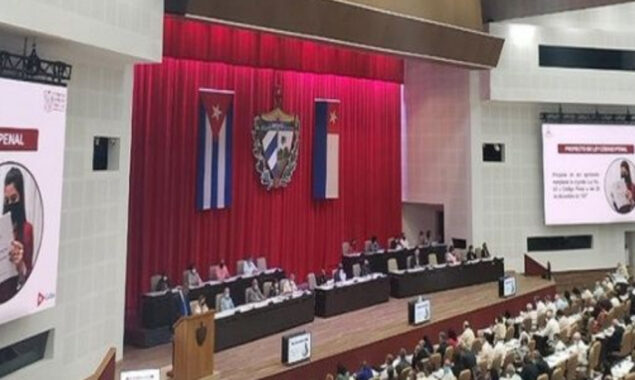
Cuba’s parliament has passed a new criminal code that, according to officials, modernises the country’s rules, but human rights organisations fear that it tightens already harsh restrictions on dissent.
The bill, which was passed late Sunday, prohibits unlawful interactions with foreign groups and persons, as well as foreign money.
The president of the Supreme Court, Rubén Remigio Ferro, described it as “a contemporary, extremely inclusive code” that promotes “prevention and education over repression” while applying “sufficiently rigorous punishments” against offences that threaten “social harmony and the stability of our nation.”
After going through a drafting commission and being published in the official gazette, it will take effect.
Cuban authorities have never had problems punishing serious dissent. Hundreds of people were detained around the island in July 2021 demonstrations, and several were condemned to 20 years in jail on grounds of sedition. Independent journalists have been imprisoned on various accusations and have frequently chosen to flee the island.
Under the new law, anyone who provide information to international organisations, associations, or even persons who are not authorised by the government face punishments ranging from 10 to 30 years in prison — or even execution in severe situations.
It does away with the ambiguous and broadly applied charge of “precriminal dangerousness,” which was occasionally used against dissidents, but it introduces new crime categories.
Those who insult or harm authorities or civilians performing their “citizens’ duty” face up to five years in jail. Those who “incite” against the socialist order can face a similar penalty, as well as a 10-year sentence if they utilise the media to do it.
The prohibition on any unlawful financing from international or local sources that helps to the commission of a crime is one of the most contentious sections. Remittances from Cubans living abroad are not affected by this section.
“With the new criminal code, Cuban authorities continue to develop a complicated and twisted legislative system of censorship, dealing a severe blow to independent journalists and outlets,” Ana Cristina Nez, the Committee to Protect Journalists’ senior researcher for Latin America and the Caribbean, said.
Corruption, speculating, and stockpiling are all punishable under the new legislation.
Despite some criticism, it keeps the death penalty in place for 23 crimes – though it hasn’t been used since 2003 – and increases punishments when offences include gender abuse, kids, or handicapped persons.
The criminal responsibility age is still set at 16.
This bill “is a more direct means for the government to equip itself against civil society, against political dissidence,” according to Saily González, a renowned activist who has been tracking the response to the 2021 demonstrations.
The senators rejected a proposal to make femicide an explicit crime, which was endorsed by Mariela Castro, daughter of former President Raul Castro. Teresa Amarelle, the chairwoman of the Federation of Cuban Women, claimed it wasn’t necessary because gender abuse is now punishable more severely.
Read More News On
Catch all the International News, Breaking News Event and Latest News Updates on The BOL News
Download The BOL News App to get the Daily News Update & Follow us on Google News.




